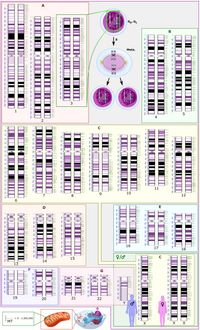
Photo from wikipedia
Abstract Structural variations (SVs) play important roles in human evolution and diseases, but there is a lack of data resources concerning representative samples, especially for East Asians. Taking advantage of… Click to show full abstract
Abstract Structural variations (SVs) play important roles in human evolution and diseases, but there is a lack of data resources concerning representative samples, especially for East Asians. Taking advantage of both next-generation sequencing and third-generation sequencing data at the whole-genome level, we developed the database PGG.SV to provide a practical platform for both regionally and globally representative structural variants. In its current version, PGG.SV archives 584 277 SVs obtained from whole-genome sequencing data of 6048 samples, including 1030 long-read sequencing genomes representing 177 global populations. PGG.SV provides (i) high-quality SVs with fine-scale and precise genomic locations in both GRCh37 and GRCh38, covering underrepresented SVs in existing sequencing and microarray data; (ii) hierarchical estimation of SV prevalence in geographical populations; (iii) informative annotations of SV-related genes, potential functions and clinical effects; (iv) an analysis platform to facilitate SV-based case-control association studies and (v) various visualization tools for understanding the SV structures in the human genome. Taken together, PGG.SV provides a user-friendly online interface, easy-to-use analysis tools and a detailed presentation of results. PGG.SV is freely accessible via https://www.biosino.org/pggsv.
Journal Title: Nucleic Acids Research
Year Published: 2022
Link to full text (if available)
Share on Social Media: Sign Up to like & get
recommendations!